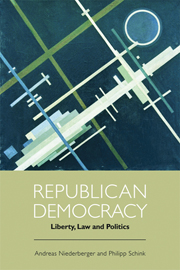Book contents
- Frontmatter
- Contents
- List of contributors
- Introduction
- 1 The Tension between Law and Politics in the Modern Republican Tradition
- 2 Impotence, Perspicuity and the Rule of Law: James Madison's Critique of Republican Legislation
- 3 Kant, Madison and the Problem of Transnational Order: Popular Sovereignty in Multilevel Systems
- 4 Republicanism and Democracy
- 5 Two Views of the City: Republicanism and Law
- 6 A Kantian Republican Conception of Justice as Nondomination
- 7 Two Republican Traditions
- 8 Freedom, Control and the State
- 9 Legal Modes and Democratic Citizens in Republican Theory
- 10 Rights, Republicanism and Democracy
- 11 Republicanism and Global Justice: A Sketch
- 12 Republicanism and Transnational Democracy
- Index
3 - Kant, Madison and the Problem of Transnational Order: Popular Sovereignty in Multilevel Systems
Published online by Cambridge University Press: 05 October 2013
- Frontmatter
- Contents
- List of contributors
- Introduction
- 1 The Tension between Law and Politics in the Modern Republican Tradition
- 2 Impotence, Perspicuity and the Rule of Law: James Madison's Critique of Republican Legislation
- 3 Kant, Madison and the Problem of Transnational Order: Popular Sovereignty in Multilevel Systems
- 4 Republicanism and Democracy
- 5 Two Views of the City: Republicanism and Law
- 6 A Kantian Republican Conception of Justice as Nondomination
- 7 Two Republican Traditions
- 8 Freedom, Control and the State
- 9 Legal Modes and Democratic Citizens in Republican Theory
- 10 Rights, Republicanism and Democracy
- 11 Republicanism and Global Justice: A Sketch
- 12 Republicanism and Transnational Democracy
- Index
Summary
It may seem surprising to many that Madison and the other eighteenth-century Federalists are closely linked to the very contemporary idea of a transnational political order. But the idea that the modern state with its centralized authority and supreme power threaten liberty had already been widely discussed in the eighteenth century. The Constitution of the United States still bears traces of the ambition that it was to establish a new political order that was neither a loose federation nor itself an enlarged state but rather something quite novel. The emergence of a transnational order was, very concretely, the exact intellectual and political problem that the Framers faced. They were not alone in this preoccupation. At the very same time, the German philosopher Kant struggled with the same issues of liberty and security in his political essays. In “Perpetual Peace,” Kant argues for a republic of republics that might be the means by which war could be abolished. To my knowledge no Federalist or Antifederalist ever mentions Kant, even though they shared common republican concerns with freedom, peace and security. While Kant was certainly aware of the American Revolution, he does not take it to be a momentous turning point for modern republics on a par with the French Revolution. But because both the Federalists and Kant shared a conception that was both cosmopolitan and republican, they inevitably occupied the same intellectual and political space, however much they arrived at very different conceptions of the proper transnational order.
- Type
- Chapter
- Information
- Republican DemocracyLiberty, Law and Politics, pp. 62 - 88Publisher: Edinburgh University PressPrint publication year: 2013



